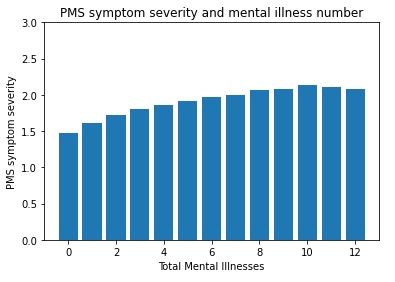After reading the Geography of Madness last year, which claimed that PMS was likely a culture-bound syndrome (as in, psychological, not ‘real’), I got curious and threw a question about PMS into my Big Kink Survey to see if it correlated with anything.
(I also did a few more pointed twitter polls, which did in fact suggest some interesting correlations)
I threw it in late, so my sample of cis women who answered this question was only 41,062.
I also specified mood-based symptoms only; it seems pretty plausible to me that people get like, bloating or whatever, and the mood-based stuff was more interesting to me.
The exact question I used was “Do you get mood-based PMS symptoms during your menstrual cycle? e.g., irritability, anxiety, depression”
The answer options were:
I don't menstruate/I don't know (recorded as N/A in the data)
No (0) (selected by 6.5%)
Yes, maybe/slightly (selected by 31.9%)
Yes, moderately (selected by 43.2%)
Yes, severely (selected by 18.4%)
For the rest of the survey: raw data here, breakdown of the demographics who took it here, survey design methodology and question overview here, no you dont need a random sample jfc here, Raw averages here, full correlation spreadsheet for cis females here (check the tab).
So in my data, what did mood-based PMS symptoms correlate with? Here’s the correlations and also the likelihood ratios. This is the first time I’m trying to calculate likelihood ratios myself - please check my code and let me know if I got it right!
Neuroticism (r=0.23, LR=2890, P=< .00001)
This was my neuroticism variable; I pulled 2 questions from each of the big-5 spectrums to do a pretty quick/dirty OCEAN test, and the neuroticism questions I used were "I worry about things” and (negative of:) "I am relaxed most of the time".
I added these two scores together (both of which ranged from -3 strong-disagree to 3 strong-agree), and this was the ‘neuroticism’ score. I would have loved to have more than just two questions, but my survey was already massive and more questions means lower completion rate, so I had to make sacrifices somewhere.
X and Y axis switched:
(also, for fun, running a twitter poll to see if the effect replicates here; I’m linking this before I see the results)
Total # of Mental Illnesses Selected (r=0.2, LR=2018, P=< .00001)
I gave people a list of 19 mental illnesses (e.g. anxiety, schizophrenia, bulimia, borderline) and asked them to check the total amount that applied to them, and asked them only to check ones that were ‘moderate to severe.’
The number of illnesses people checked was correlated with response to the PMS question at r=0.2.

Anxiety (r=0.15, LR=1323, P< .00001) and Depression (r=0.14, LR=1216, P< .00001)
As usual, my personal cutoff for ‘reporting results’ is r=0.12, which is quite small, and we’re starting to hit ‘very minor effects’ territory.
Due to really constricted survey design, the way these scores worked were that if you checked a box in the initial mental illnesses list for one of them, this counted as a score of “1”. You then got another question that presented to you all the ones you’d just selected, and asked you to pick the one that applied the most, and then applied a value of “2” to that score total. This is a bit of a weird way of doing it, but I figured it was a good compromise to at least get a little bit of weighting going on across 19 elements via while using only 2 total questions.
Experiencing Sexual Assault As An Adult (r=0.13, LR=813, P< .00001)
This is again, a very small correlation!
I asked “As an adult, have you been the victim of sexual assault? Sexual assault means unwanted physical sexual contact from someone else, such as groping or rape.” with 4 option responses from 0 (no) to 3 (yes, severely).
X and Y axis switched:
Aaaand that’s it.*
Yeah - I asked around 300ish questions, measuring around 1100 elements total, and those are the only things in my data that correlated with PMS symptoms.
The rest of my questions, and thus all the stuff that didn’t correlate, was mostly about childhood, porn/sex habits, and fetishes/sexual preferences. I didn’t ask much about beliefs/outlooks or personality - there were some big5 questions, a few questions about powerlessness, attachment style, relationship status, and the religion you were brought up in, but that was it.
Honorable mentions, things that were still significantly correlated but too tiny to really mean anything: powerlessness (.1), being sexually assaulted as a child (.1), being verbally abused by a man as a child (.1), being into cunnilingus (.1), having PTSD (.09), total fetishes (.08), body dysmorphia (0.08), and being spanked more frequently as a child. (0.08).
*I had one correlation showing up at 0.23 for agreement for a pedophilia n=~800 subquestion; however agreement with this subquestion is strongly correlated with a bunch of random stuff and I’m pretty sure it’s a glitch in my column that I haven’t ironed out yet, so I’m ignoring it but making a note that I’m doing so.











I was on hormonal birth control the first twenty years I had my period, never had PMS, and always thought it was a completely made up/exaggerated thing by neurotic women. I also score extremely low, like outlier weirdo level for a female, on neuroticism.
But once I went off hormonal BC, I had to admit it was definitely real. Embarrassingly so, and I really hate the idea that my mood/personality is controlled by a monthly cycle like that. I don't even usually know when I'm going to get it because I don't pay attention, but whenever I do, it's like, oh THAT'S why I was such an irritable bitch yesterday.
I think neurotic women are just more likely to get upset about, amplify, and dwell on ANYTHING with a negative valence, whether it's an event or a mood or a physical condition.
And now I need Scott Alexander to comment on this so I know what to think about it :)